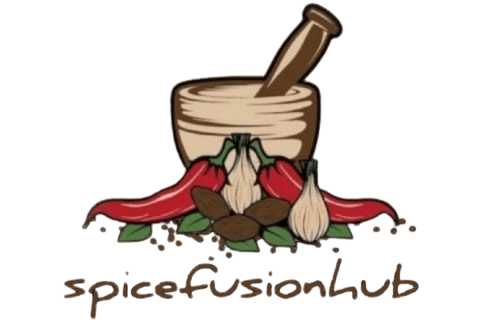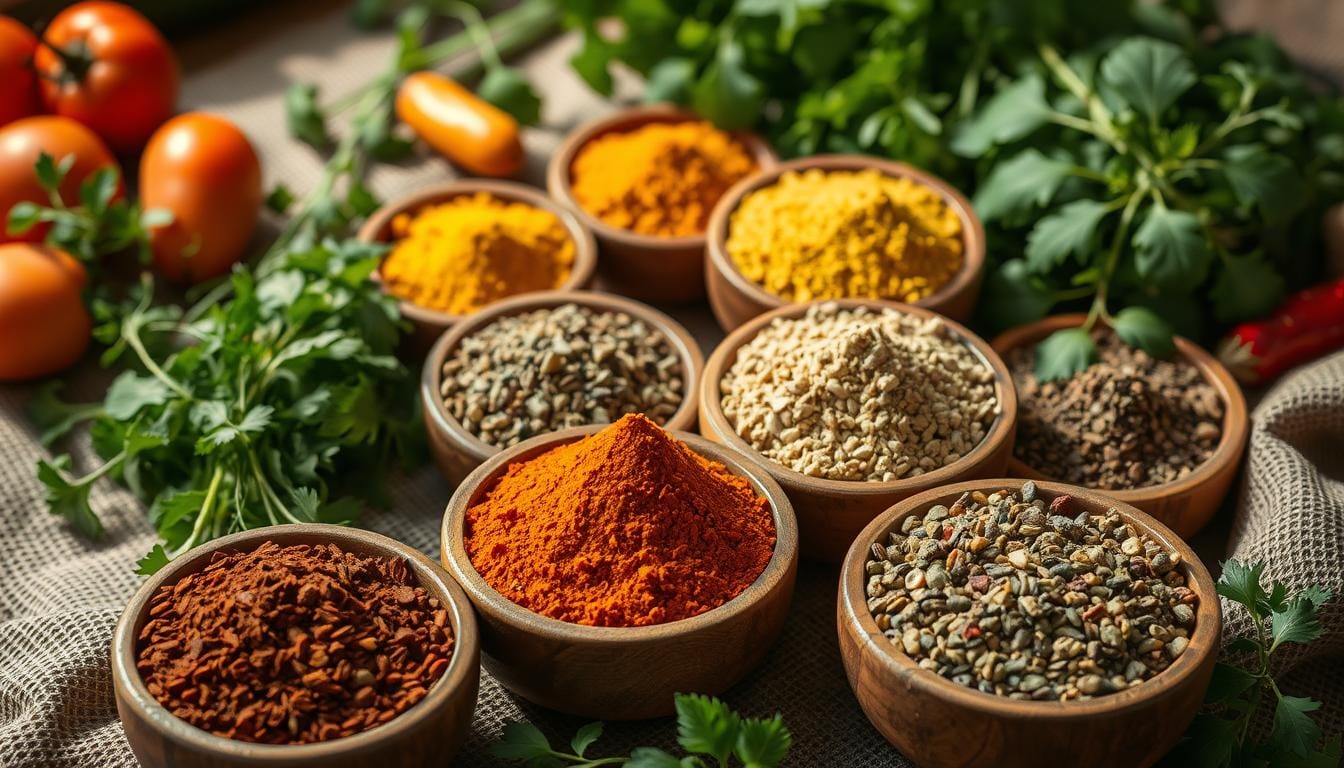Spices in a healthy diet
What if the key to a healthier diet was not just about cutting out unhealthy foods, but also about adding in some powerful ingredients?Spices In A Healthy Diet have been used for centuries to add flavor and nutrition to meals.
With the increasing awareness of healthy eating, the benefits of spices in diet have become an essential part of a balanced diet. Can spices really make a difference in our overall health and wellbeing?
Key Takeaways
- Spices can add flavor and nutrition to meals
- Spices for healthy eating have been used for centuries
- The benefits of spices in diet are essential for a balanced diet
- Spices can make a difference in our overall health and wellbeing
- Incorporating spices into daily meals can be easy and delicious
- Understanding the benefits of spices can help us make informed choices about our diet
Understanding the Power of Spices for Healthy Eating
Spices have been a cornerstone of healthy eating for centuries, with various cultures utilizing them to promote wellness and prevent disease.
The use of nutritious spices in cooking is not only a matter of taste but also a way to incorporate essential nutrients and health benefits into our diets. From reducing inflammation to boosting metabolism, spices play a crucial role in maintaining a healthy diet.
The best spices for health are those that have been proven to have a positive impact on our wellbeing. Some of the most nutritious spices include turmeric, ginger, and cinnamon, which have been shown to have anti-inflammatory properties and can help to reduce the risk of chronic diseases.
By incorporating these spices into our daily meals, we can take a proactive approach to maintaining our health and wellbeing.
The Historical Role of Spices in Wellness
Historically, spices have been used for their medicinal properties, with many cultures relying on them to prevent and treat various health conditions.
The use of spices in traditional medicine has been passed down through generations, with many of these remedies still being used today.
Modern Science Backing Traditional Uses
Modern science has confirmed the numerous health benefits of spices, with many studies demonstrating their potential to prevent and treat various health conditions.
By understanding the power of spices for healthy eating, we can make informed choices about the foods we eat and the spices we use, taking a proactive approach to maintaining our health and wellbeing.
Key Health Benefits of Cooking with Spices
Cooking with spices can add flavor and nutrition to meals, providing numerous health benefits. Incorporating spices into meals is a great way to reduce the risk of chronic diseases and promote digestive health.
Some of the key health benefits of cooking with spices include reducing inflammation, improving heart health, and supporting immune function.
Using healthy seasoning options can also help to reduce the need for salt and sugar in meals, making them a great option for those looking to reduce their intake of these substances.
Some popular spices with health benefits include turmeric, ginger, and cinnamon. These spices can be easily incorporated into meals by adding them to soups, stews, and stir-fries.
- Add spices to soups and stews for extra flavor and nutrition
- Use spices to season meats and vegetables before grilling or roasting
- Mix spices into yogurt or oatmeal for a healthy and flavorful breakfast
By incorporating spices into meals and using healthy seasoning options, individuals can take a proactive approach to maintaining a healthy diet and reducing the risk of chronic diseases.
| Spice | Health Benefit |
|---|---|
| Turmeric | Reduces inflammation |
| Ginger | Supports digestive health |
| Cinnamon | Helps to regulate blood sugar levels |
Most Nutritious Spices for Your Kitchen
Spices are a great way to add flavor and nutrition to meals, and they can also provide numerous health benefits. When it comes to spice health properties, some spices stand out for their potential to promote healthy eating. By using spices for flavor and wellness, individuals can enhance their overall well-being.
A variety of spices can be used to promote healthy eating, including anti-inflammatory spices, metabolism-boosting options, spices for digestive health, and antioxidant-rich choices. Some examples of nutritious spices include:
- Turmeric, which has anti-inflammatory properties
- Ginger, which can aid in digestion
- Cinnamon, which can help boost metabolism
- Cayenne pepper, which is rich in antioxidants
These spices can be incorporated into meals in a variety of ways, such as adding them to soups, stir-fries, or using them as a seasoning for meats and vegetables. By making informed choices about the spices used in cooking, individuals can take advantage of their spice health properties and promote healthy eating.
In addition to their individual health benefits, spices can also be combined to create delicious and nutritious meals. For example, a spice blend featuring turmeric, ginger, and cinnamon can be used to add flavor and nutrition to a variety of dishes. By using spices for flavor and wellness, individuals can enhance their overall health and well-being.
| Spice | Health Benefit |
|---|---|
| Turmeric | Anti-inflammatory |
| Ginger | Aids in digestion |
| Cinnamon | Boosts metabolism |
| Cayenne pepper | Rich in antioxidants |
Smart Ways to Incorporate Spices into Daily Meals
Incorporating spices for healthy eating into daily meals can be easy and convenient, adding flavor and nutrition to meals. One smart way to do this is by adding spices to soups and stews, which can enhance the flavor and provide benefits of spices in diet. For example, turmeric and ginger can be added to soups for their anti-inflammatory properties.
Another way to incorporate spices is by using them as marinades for meats. A mixture of spices like cumin, coriander, and paprika can be used to marinate chicken or beef, adding flavor and tenderness. Here are some tips to get you started:
- Start with small amounts: Begin with a small amount of spice and adjust to taste.
- Experiment with different combinations: Try pairing different spices to create unique flavors.
- Use spices in baked goods: Spices like cinnamon and nutmeg can be used in baked goods like cakes and cookies.
In addition to adding flavor, spices for healthy eating can also provide benefits of spices in diet like boosting metabolism and aiding digestion. By incorporating spices into daily meals, individuals can experience these benefits while enjoying delicious and flavorful food.
| Spice | Health Benefit |
|---|---|
| Turmeric | Anti-inflammatory properties |
| Ginger | Aids digestion |
| Cinnamon | Lowes blood sugar |
Creating a Healthy Spice Pantry
To start building a healthy spice pantry, it’s essential to understand the benefits of using nutritious spices in your daily meals. These spices not only add flavor but also provide numerous health benefits, making them a great addition to your kitchen.
The best spices for health can vary, but some of the most popular ones include turmeric, ginger, and cinnamon.
When it comes to stocking your spice pantry, there are a few essential spices to consider. These include:
- Turmeric, known for its anti-inflammatory properties
- Ginger, which aids in digestion and reduces nausea
- Cinnamon, a great antioxidant that can help lower blood sugar levels
Proper storage and freshness are crucial to maintaining the quality and potency of your spices. It’s recommended to store them in a cool, dry place, away from direct sunlight. Building your collection gradually is also a great way to ensure that you’re using the spices before they expire or lose their flavor.
By incorporating these nutritious spices into your meals, you can create a variety of delicious and healthy dishes. Whether you’re looking to boost your metabolism or simply add some flavor to your food, the best spices for health can help.
With a well-stocked spice pantry, you’ll be able to experiment with new recipes and flavors, making healthy eating a breeze.
Common Mistakes to Avoid When Using Spices
When incorporating spices into meals, it’s easy to get carried away with the flavors and aromas. However, there are common mistakes to avoid to ensure you’re getting the most out of your spices.
One of the most significant errors is overusing spices, which can overpower the dish and overwhelm the palate.
Avoid using too much of a single spice, and instead, opt for a balanced blend of healthy seasoning options. This will not only enhance the flavor but also provide a range of nutritional benefits. Some common mistakes to watch out for include:
- Using low-quality spices that lack flavor and aroma
- Not storing spices properly, leading to a loss of potency
- Not experimenting with different spice combinations
By being mindful of these mistakes, you can unlock the full potential of spices and take your cooking to the next level. Remember to always choose high-quality spices and store them properly to ensure maximum flavor and nutrition.

Conclusion: Embracing the Spice-Enhanced Healthy Lifestyle
As we’ve explored, incorporating spices into your daily meals can be a simple yet powerful way to enhance both the flavor and the health properties of your food.
By making spices a regular part of your cooking routine, you can unlock a world of culinary possibilities while nourishing your body with essential vitamins, minerals, and antioxidants.
Whether you’re looking to add a zesty kick to your dishes, soothe digestive issues, or support your overall well-being, the versatile world of spices has something to offer.
By stocking your pantry with a variety of flavorful options and experimenting with new recipes, you can gradually build a spice-enhanced healthy lifestyle that suits your tastes and nutritional needs.
So, embrace the power of spices and let them guide you on a delicious journey towards better health and wellness. Your taste buds and your body will thank you!







